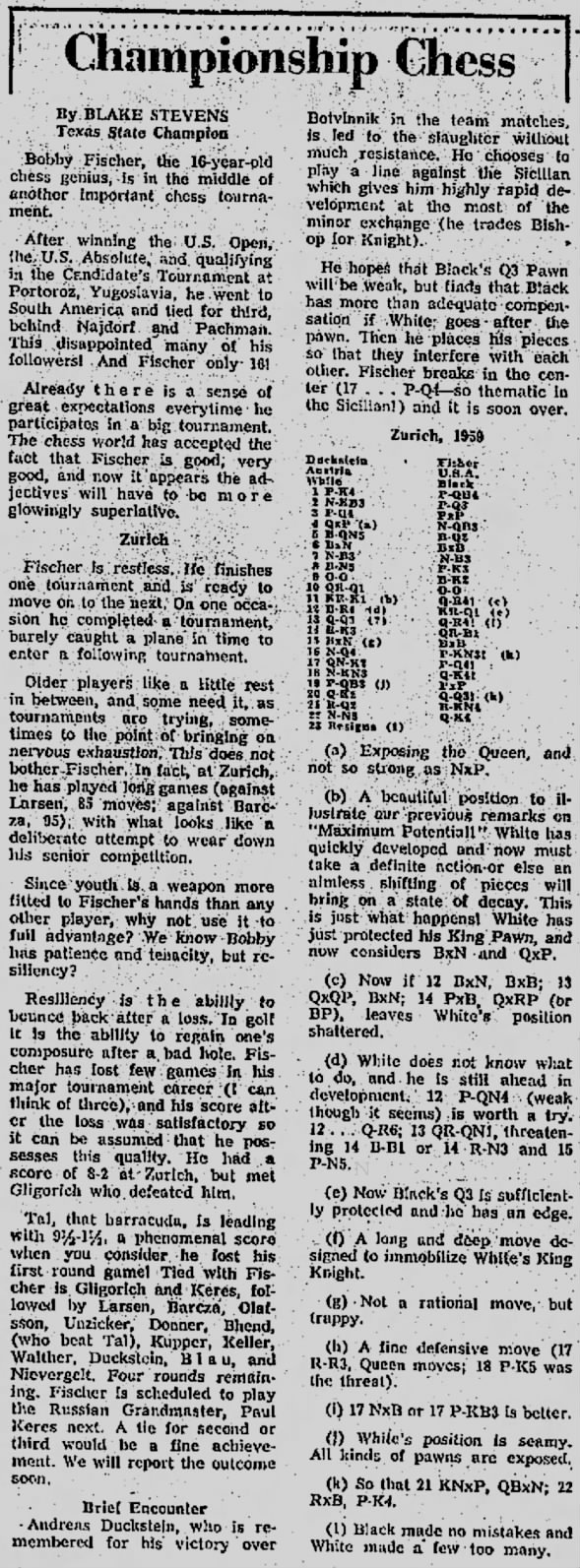< Prev Index Next >
 Championship Chess 20 Jun 1959, Sat Express and News (San Antonio, Texas) Newspapers.com
Championship Chess 20 Jun 1959, Sat Express and News (San Antonio, Texas) Newspapers.com
Championship Chess By Blake Stevens, Texas State Champion
Bobby Fischer, the 16-year-old chess genius, is in the middle of another important chess tournament.
After winning the U.S. Open, the U.S. Absolute, and qualifying in the Candidate's Tournament at Portoroz, Yugoslavia, he went to South America and tied for third, behind Najdorf and Pachman. This disappointed many of his followers! And Fischer only 16!
Already there is a sense of great expectations every time he participates in a big tournament. The chess world has accepted the fact that Fischer is good, very good, and now it appears the adjectives will have to be more glowingly superlative.
Zurich
Fischer is restless. He finishes one tournament and is ready to move on to the next. On one occasion he completed a tournament, barely caught a plane in time to enter a following tournament.
Older players like a little rest in between, and some need it, as tournaments are trying, sometimes to the point of nervous exhaustion. This does not bother Fischer. In fact, at Zurich, he has played long games (against Larsen, 85 moves; against Barcza, 95), with what looks like a deliberate attempt to wear down his senior competition.
Since youth is a weapon more fitted to Fischer's hands than any other player, why not use it to full advantage? We know Bobby has patience and tenacity, but resiliency?
Resiliency is the ability to bounce back after a loss. In golf it is the ability to regain one's composure after a bad hole. Fischer has lost a few games in his major tournament career. (I can think of three), and his score after the loss was satisfactory so it can be assumed that he possesses this quality. He had a score of 8-2 at Zurich, but met Gligorich who defeated him.
Tal, that barracuda, is leading with 9½-1½, a phenomenal score when you consider he lost his first round game Tied with Fischer is Gligorich and Keres, followed by Larsen, Barcza, Olafsson, Unzicker, Donner, Bhend, (who beat Tal), Kupper, Keller, Walther, Duckstein, Blau, and Nievergelt. Four rounds remaining. Fischer is scheduled to play the Russian Grandmaster, Paul Keres, next. A tie for second or third would be a fine achievement. We will report the outcome soon.
Andreas Dueckstein vs Robert James Fischer
Zurich (1959), Zurich SUI, rd 7, May-27
Sicilian Defense: Chekhover Variation (B53) 0-1
Brief Encounter Andreas Duckstein, who is remembered for his victory over Botvinnik in the team matches, is led to the slaughter without much resistance. He chooses to play a line against the Sicilian which gives him highly rapid development at the most of the minor exchange (he trades Bishop for Knight).
He hopes that Black's Q3 Pawn will be weak, but finds that Black has more than adequate compensation if White goes after the pawn. Then he places his pieces so that they interfere with each other. Fischer breaks in the center (17. ...P-Q4—so thematic in the Sicilian!) and it is soon over.
(a) Exposing the Queen, and not so strong as NxP.
(b) A beautiful position to illustrate our previous remarks on “Maximum Potential” White has quickly developed and now must take a definite action or else an aimless shifting of pieces will bring on a state of decay. This is just what happens! White has just protected his King Pawn, and now considered BxN and QxP.
(c) Now if 12. BxN BxB; 13. QxQP BxN; 14. PxB QxRP (or BP), leaves White's position shattered.
(d) White does not know what to do, and he is still ahead in development. 12. P-QN4 (weak though it seems) is worth a try. 12. ... Q-R6; 13. QR-QN1 threatening 14. B-B1 or 14. R-N3 and 15. P-N5.
(e) Now Black's Q3 is sufficiently protected and he has an edge.
(f) A long and deep move designed to immobilize White's King Knight.
(g) Not a rational move, but trappy.
(h) A fine defensive move (17. R-R3, Queen moves; 18. P-K5 was the threat).
(i) 17. NxB or 17 P-KB3 is better.
(j) White's position is seamy. All kinds of pawns are exposed.
(k) SO that 21. KNxP QBxN; 22. RxB, P-K4.
(l) Black made no mistakes and White made a few too many.






















